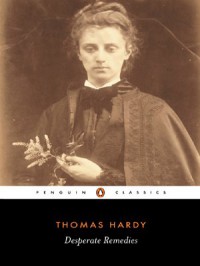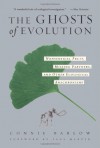Currently reading
Cristofori's Dream
Your Inner Fish: A Journey Into The 3.5 Billion Year History Of The Human Body
The Enchanted Wood
The Sparrow
The Ghosts Of Evolution Nonsensical Fruit, Missing Partners, And Other Ecological Anachronisms
Desperate Remedies (Penguin Classics)
 Thomas Hardy’s first book was rejected by publishers because the plot went nowhere. The plot certainly went somewhere with his second book and first published novel, Desperate Remedies. Considering how many of Thomas Hardy’s novels were made into movies, I’m surprised that this one wasn’t. He’s built a very strong cast of characters. The heroine is strong and rational while the villain is dastardly indeed. The tale is one part mystery and one part love triangle. I’d even go as far as to call it gothic. This is the first time I’ve read anything by Hardy remotely approaching gothic, and I quite enjoyed it.
Thomas Hardy’s first book was rejected by publishers because the plot went nowhere. The plot certainly went somewhere with his second book and first published novel, Desperate Remedies. Considering how many of Thomas Hardy’s novels were made into movies, I’m surprised that this one wasn’t. He’s built a very strong cast of characters. The heroine is strong and rational while the villain is dastardly indeed. The tale is one part mystery and one part love triangle. I’d even go as far as to call it gothic. This is the first time I’ve read anything by Hardy remotely approaching gothic, and I quite enjoyed it.After the untimely deaths of their parents, two young adults go out into the world together to try to fend for themselves. The brother tries to find a job related to his architectural studies while the sister, Cytherea, looks for a position as a lady’s maid. As fate would have it, Cytherea accepts a position in the home of a lady whose past is closely connected to that of Cytherea’s family.
Two men vie for Cytherea’s attention, but she finds herself not trusting either of them. The first tries to kiss her in a row boat and the second creeps her out by drawing her into his house during a thunderstorm and playing his organ for her. No, this is not a euphemism. And, no, he doesn’t actually know how to play an organ (this sounds strangely like a bad date I once had). She eventually finds out both of these overly-forward guys have dirty secrets and feels justified in her contentment to stay single. I was quite happy to find that Cytherea has her head on straight enough to initially steer clear of these guys. She wisely heeds the advice that her father gives at the beginning of the book: “don't love too blindly: blindly you will love if you love at all, but a little care is still possible to a well-disciplined heart.” It’s too bad we can’t all learn from the mistakes of others as well as Cytherea has. “Scheme to marry? I'd rather scheme to die!” she says. Yet, she has her own lessons to learn.
Unfortunately, because of her brother’s failing health, she eventually finds herself pressured to marry to avoid sending her brother to a county hospital. Oh the horror. I found it very infuriating that the brother insisted that his sister marry for money when he knew it would cause her a life of sadness simply because he didn’t want to take the chance he might lose a limb at the county hospital. I can’t imagine asking someone to sacrifice the happiness of their entire life for the sake of my limb. But that’s what brothers are for, right?
The last part of the book is fast-paced as you try to determine if your suspicions are correct about the dark secrets various characters may be harboring. There are a few clues along the way. Unfortunately, I read one of the biggest secrets -- one that’s only revealed in the last few pages -- in a synopsis for this book somewhere online. In a way, it was interesting to read the book through that lens, but I would have rather not have had it spoiled for me. Still, that was not the most surprising of gothically delectable revelations.
I think that my favorite quote in the book is from a man who is doomed to imminent death. He says, “I am now about to enter on my normal condition. For people are almost always in their graves. When we survey the long race of men, it is strange and still more strange to find that they are mainly dead men, who have scarcely ever been otherwise.” I can’t seem to forget this statement in the few days since I read it. It’s caused myself to marvel daily that I’m alive now in the whole history of the universe. That statement, like Carl Sagan’s “Cosmic Calendar”, reveals so much of how infinitesimal man’s existence is in the universe.
Hardy has a way of taking situations and twisting them to the breaking point in his plots. His characters are interconnected in such deliciously complicated ways. But so much of it is bound up in the laws or in the societal expectations of the time. It’s like how we read a book from a couple of decades ago and think how everything would be far less complicated with a cell phone. With Hardy, everything would be far less complicated if the characters weren’t worried about what the Joneses thought or if they could easily get a divorce without social ostracism.
One curious scene in the book appears to be homoerotic in nature. In general, Hardy’s later books expose the failings of Victorian cultural norms and the complications that they create for people. But this seems to be a different beast altogether. Either the scene is written innocently or its written as a bit of Victorian spite. I can’t seem to find anything on the subject other than that, when Queen Victoria was asked why there weren’t any laws against female homosexuality, she replied that women don’t do that sort of thing. So, was Hardy trying to say that they indeed did or was he really just writing an innocent scene? I would posit that it’s the former since he was made to change the scene in later editions to call the affections something akin to “motherly love”. I don’t buy it. If the Queen thinks that lesbianism doesn’t exist, you can write about it to your heart’s content with impunity.
I can very well see how this book helped to launch Hardy’s future success. It’s a close second so far among the books of his I’ve read (my favorite so far being Two on a Tower). I highly suggest it for anyone interested in reading something by Hardy, especially if they like a book that’s more on the dark side.







